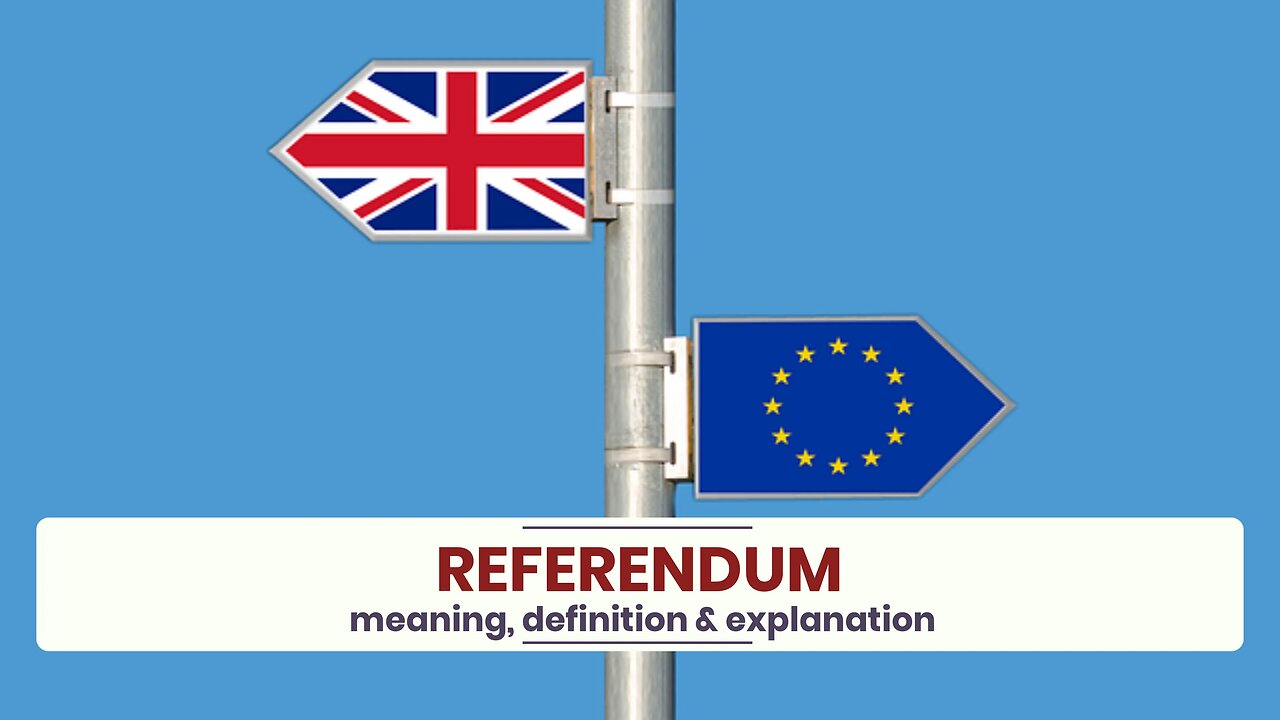Premium Only Content

What is REFERENDUM?
✪✪✪✪✪
http://www.theaudiopedia.com
✪✪✪✪✪
What does REFERENDUM mean? REFERENDUM meaning - REFERENDUM definition - REFERENDUM explanation. What is the meaning of REFERENDUM? What is the definition of REFERENDUM? What does REFERENDUM stand for? What is REFERENDUM meaning? What is REFERENDUM definition?
A referendum (plural referendums, see below) is a direct vote in which an entire electorate is asked to vote on a particular proposal. This may result in the adoption of a new law. In some countries it is synonymous with a plebiscite or a vote on a ballot question.
Some definitions of 'plebiscite' suggest that it is a type of vote to change the constitution or government of a country. However, some other countries define it differently. For example, Australia defines 'referendum' as a vote to change the constitution, and 'plebiscite' as a vote that does not affect the constitution. In Ireland, the vote to adopt its constitution was called a "plebiscite", but a subsequent vote to amend the constitution is called a 'referendum', and so is a poll of the electorate on a non-constitutional bill.
'Referendum' is the gerundive form of the Latin verb refero, literally "to carry back" (from the verb fero, "to bear, bring, carry" plus the inseparable preposition re-, here meaning "back".) As a gerundive is an adjective, not a noun, it cannot be used alone in Latin and must be contained within a context attached to a noun such as Propositum qui referendum est popolo, "A proposal which must be carried back to the people". The addition of the verb sum (3rd person singular, est) to a gerundive, denotes the idea of neccessity or compulsion, that which "must" be done, rather than that which is "fit for" doing). Its use as a noun in English is thus not a strictly grammatical usage of a foreign word, but is rather a freshly coined English noun, which therefore follows English grammatical usage, not Latin grammatical usage. This determines the form of the plural in English, which according to English grammar should be "referendums". The use of "referenda" as a plural form in English (treating it as a Latin word and attempting to apply to it the rules of Latin grammar) is thus insupportable according to the rules of both Latin and English grammar alike.
The name and use of the 'referendum' is thought to have originated in the Swiss canton of Graubünden as early as the 16th century.
The term 'plebiscite' has a generally similar meaning in modern usage, and comes from the Latin plebiscita, which originally meant a decree of the Concilium Plebis (Plebeian Council), the popular assembly of the Roman Republic. Today, a referendum can also often be referred to as a plebiscite, but in some countries the two terms are used differently to refer to votes with differing types of legal consequences. For example, Australia defines 'referendum' as a vote to change the constitution, and 'plebiscite' as a vote that does not affect the constitution. In contrast, Ireland has only ever held one plebiscite, which was the vote to adopt its constitution, and every other vote has been called a referendum.
The term referendum covers a variety of different meanings. A referendum can be binding or advisory. In some countries, different names are used for these two types of referendum.
Referendums can be further classified by who initiates them: mandatory referendums prescribed by law, voluntary referendums initiated by the legislature or government, and referendums initiated by citizens.
From a political-philosophical perspective, referendums are an expression of direct democracy. However, in the modern world, most referendums need to be understood within the context of representative democracy. Therefore, they tend to be used quite selectively, covering issues such as changes in voting systems, where currently elected officials may not have the legitimacy or inclination to implement such changes.
Critics of the referendum argue that voters in a referendum are more likely to be driven by transient whims than by careful deliberation, or that they are not sufficiently informed to make decisions on complicated or technical issues. Also, voters might be swayed by propaganda, strong personalities, and expensive advertising campaigns. James Madison argued that direct democracy is the "tyranny of the majority".
Some opposition to the referendum has arisen from its use by dictators such as Adolf Hitler and Benito Mussolini who, it is argued, used the plebiscite to disguise oppressive policies as populism. Hitler's use of plebiscites is argued as the reason why, since World War II, there has been no provision in Germany for the holding of referendums at the federal level.
-
 2:28
2:28
The Audiopedia
1 year agoWhat is MORTGAGE BROKER?
27 -
 LIVE
LIVE
Major League Fishing
9 days agoLIVE! - Fishing Clash Team Series: Patriot Cup - Day 4
312 watching -
 1:31:04
1:31:04
Rebel News
1 day agoTommy Robinson & Avi Yemini Banned from Al-Aqsa mosque!
3.84K25 -
 LIVE
LIVE
XxXAztecwarrior
1 hour agoPrinting money on Delta
9 watching -
 2:04:59
2:04:59
LFA TV
1 day agoTHE RUMBLE RUNDOWN LIVE @9AM EST
53.8K17 -
 10:02:37
10:02:37
Plan ₿ Forum
1 day agoWAGMI Stage – Lugano Plan ₿ Forum 2025 | Live from Lugano 🇨🇭
520K22 -
 34:37
34:37
vivafrei
5 hours agoLive from Lugano Switzerland, Plan B RECAP with Matt Kohrs! BOOYA!
40.4K11 -
 46:25
46:25
X22 Report
21 hours agoMr & Mrs X - DoEd Was Used To Brainwash The Children, Trump Shut It Down - EP 13
51.3K28 -
 26:51
26:51
efenigson
2 days agoSwitzerland: Still the Land of Freedom? Samuel Kullman | You're The Voice - LIVE from Lugano PlanB!
40.6K5 -
 1:07:25
1:07:25
Wendy Bell Radio
10 hours agoPet Talk With The Pet Doc
43K37